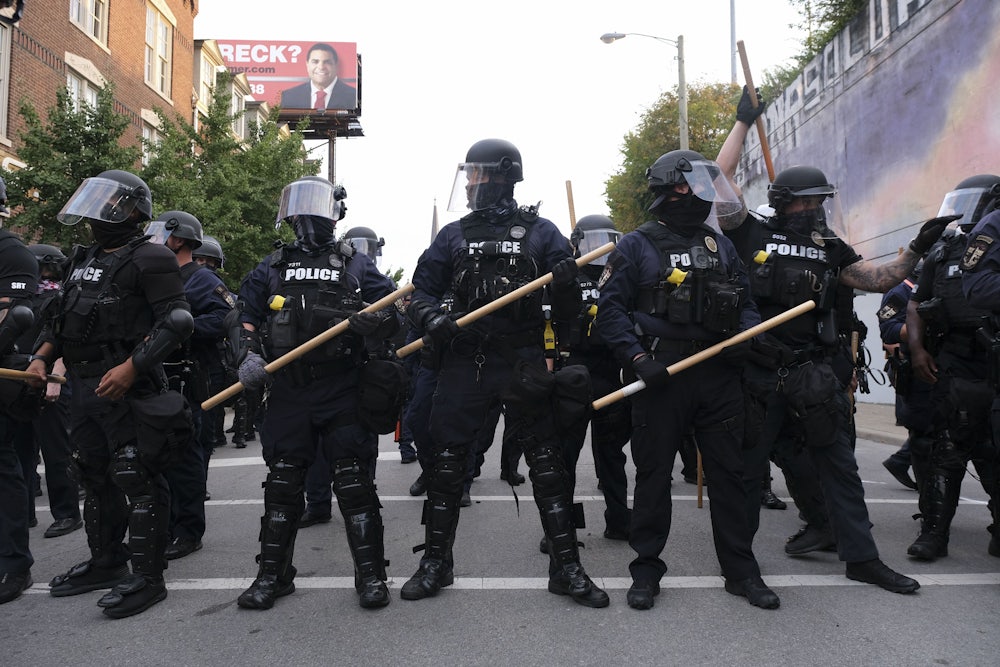“For many, you enjoy calling the police officers [sic] path ‘a job.’ I’m here to tell you that you’re wrong,” wrote Asheville, North Carolina, police officer Lindsay Rose, in an October blog post serving as her public resignation. Policing, she wrote, is a “calling,” “unlike a job or a career, is something you’re going to do no matter what, whether you’re getting paid for it or not.” And yet Rose was stepping away.
Last week, The New York Times reported that “Police Have Been Quitting in Droves in the Last Year.” And the paper turned to Rose’s account to help explain why. “She said she was spit on. She was belittled. Members of the city’s gay community, an inclusive clan that had welcomed her in when she first settled in Asheville, stood near her at one event and chanted, ‘All gay cops are traitors,’ she said.”
The Times then situated Rose’s story within a broader narrative of racial justice protests, cops quitting, and a rise in homicides—in a way strongly suggesting a link between these three phenomena: “A survey of almost 200 police departments indicated that retirements were up 45 percent and resignations rose by 18 percent in the year from April 2020 to April 2021”—that is, the year following a national uprising against police who kill with apparent impunity—“when compared with the previous 12 months, according to the Police Executive Research Forum, a Washington policy institute,” the Times reports. “At the same time, many cities are contending with a rise in shootings and homicides.”
Rose’s blog and the Times story are part of a consistent, fairly exaggerated narrative emerging in response to ongoing efforts to end police violence: that such calls and protests have demoralized police to the extent that officers are fleeing the force and that a spike in crime is the inevitable price we will pay. This, after all, is the message behind statements this week from the Biden administration trying to characterize Republicans as the ones who “really” want to defund the police, behind overheated stories about a “rise” in car thefts (as compared to last year, during the height of the pandemic), behind persistent claims from political observers (and art critics) that defund the police is just a bad slogan rather than part of a political project of remaking public safety, and behind the bizarre “Dear John” turn in the cop-tell-all genre. What unites these narrative threads is the not-so-subliminal threat of punishment for those who have stepped out of order.
Characterizing police work as a calling makes it sound essential—like it has always existed, or that we cannot exist without it. That’s not true. Carceral politics, however, run deep: When Rose blogged that she cannot stop being a cop, she is telling us this quite plainly.
In 2019, the Asheville Citizen Times ran a story featuring Rose as one of two newly appointed Asheville police LGBTQ+ liaisons. In a photo that ran with the story, Rose wore her uniform and her gear casually, with a bodycam and an Apple Watch and short sleeves showing off a tattooed forearm and biceps. By October 2020, when Rose and other members of the Asheville police quit, in what local news called a “walkout,” what had shifted? In Minneapolis, a police officer murdered George Floyd, sparking protests in Asheville, which police took personally.
If police really do feel under siege, though, it is not borne out by their actions. The Asheville police departures highlighted by the Times don’t really tell the story they are meant to. When News 13 in Asheville reported on the department shake-up back in October 2020, the police union said a number of officers simply took jobs in departments outside of Asheville. The Times story from last week reported that of the 80 who left the department, half continue to work as police—including Lindsay Rose. She quit only to rejoin the same department in a new role. She says she was enticed in part by new rules: “She could now wear short sleeves, for example, displaying the tattoos on her arms. Her wife, an Asheville native, endorsed her return as well.”
If policing is a calling, surely it is also about whom officers feel called to serve: Discretion defines policing, not just the choices officers make routinely about whom to stop and whom to arrest but also whom they see as deserving of protection and whom they must protect people from. Police are quitting because that power has been challenged. Many of them are not even leaving behind policing as a profession—and as Rose illustrated, even if they did quit for good, they still see themselves as police forever.
More than alleged walkouts or misleading crime statistics, the consistent theme in response to the public pressure of the past year is police and their supporters doubling down on police and their power. That the narrative of protests causing mass exodus—and the exodus coinciding with a rise in crime—has crystallized so quickly in mainstream publications clarifies the status of police in our everyday lives: If you want police protection, you are expected to protect the police from protest.




